Two knives, footprints and no witnesses: The murder of a judge that keeps Mexico in suspense
The prosecutor in the state of Aguascalientes defends his theory about the murder of Ociel Baena Saucedo at the hands of his partner. However, the family of the jurist and LGBTQ activist categorically rejects the conclusions reached by the authorities
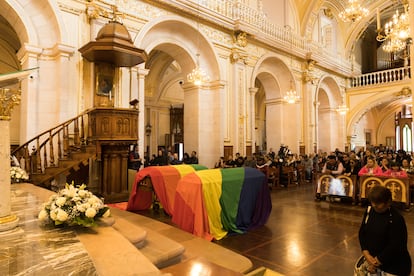

Jesús Figueroa Ortega — prosecutor for the Mexican state of Aguascalientes — remembers one of the last visits that Magistrate Ociel Baena Saucedo made to his office. Sitting in the leather chair in front of him, the young judge told him about the difficulties he was having as the first non-binary person to hold a position on the State Electoral Tribunal. There were conflicts with his colleagues; every time he published something on social media, “positive and negative comments” rained down on him.
Today, Figueroa Ortega is investigating the death of the jurist and his partner — Dorian Daniel Nieves Herrera — which occurred early Monday morning. His theory is that Baena’s partner attacked the magistrate, killed him, and then committed suicide. The prosecutor spent all of this past Tuesday, November 14, talking about the issue to local, national and international media outlets. He assures the public that he hasn’t ruled out any possibilities, but that — after about 30 hours of investigations and analysis — it’s clear that there are no indications that anyone other than the couple had been in the magistrate’s house.
“We’re working because we’re not here to close [the file],” Figueroa emphasizes, while offering EL PAÍS an account of what the State Prosecutor’s Office has collected in the 48 hours since the bodies of Ociel Baena and Dorian Hernández were found in the magistrate’s home, in the Punta del Cielo subdivision in Aguascalientes. “What the crime scene shows us is [the aforementioned] scenario. We’re ruling out the existence of a third party. Now, let’s see what motivated Dorian. According to the chemical opinion, he had methamphetamine in his body. I don’t know if this is something that could be an accelerator,” he says.
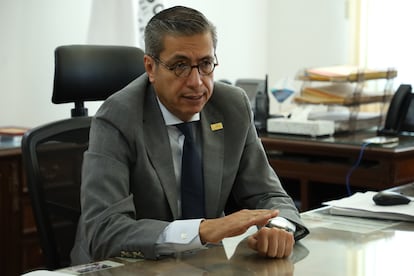
The prosecutor refers to the line of investigation in which 37-year-old Nieves — after having repeatedly attacked his partner with a razor — cut Baena’s jugular vein, thus ending his life. The investigation suggests that “once he realized what he had done,” he decided to kill himself in the same way, with another knife of the same type. This version has been argued by the prosecutor through the discovery of footprints of a bare foot that belong to Dorian. According to investigators, there’s a path from the bedroom where a fight allegedly began to the living room, where both lifeless bodies were found.
The murder of Ulises Nava: setting a precedent
Magistrate Ociel Baena Saucedo had been assigned a state police officer as a bodyguard after the murder — on July 17 of this year — of Ulises Nava, a professor and activist for LGTBQ rights in Aguascalientes. Both had attended, along with other public officials and local and national activists, the first National Strategic Litigation Congress for Rainbow Quotas. On his way out, Nava was shot dead at the doors of the Discover Museum, in the center of the city.
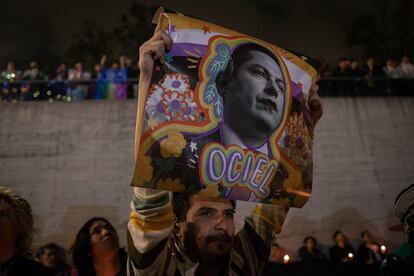
In an interview he gave to the newspaper Milenio in the State Prosecutor’s Office, Baena stated: “We all fear for our lives. It could have been any of us. We’re dismayed, of course, we’re afraid… but we’ll be more afraid if we stop raising our voices, if we continue pretending that nothing is happening. I indirectly attribute these homicides that occur in our population to those people who hold public offices, like Marta Márquez, the senator; like Gabriel Quadri, federal deputy; like Teresa Castell, federal deputy; Teresa Rangel, a local representative. [They have all] issued hate speeches against us (members of the LGBTQ community).” After Nava’s murder, Baena requested protection and was assigned a state trooper, who wasn’t with him in the early hours of Monday, when he was murdered. The prosecutor affirms: “Ociel Baena had instructed his bodyguard to show up [at a later time on] Monday.”
When his death was announced on the news, the staff at the Aguascalientes International Airport quickly recognized the magistrate from the many trips he made throughout the country. Early Monday morning, Baena and his partner, Dorian Nieves, had returned to the city from a three-day-long trip. They boarded a vehicle in the airport’s parking lot and headed home. According to information from the prosecution, Baena and Nieves arrived at the Punta del Cielo subdivision between 1:05 and 1:10 in the morning. Then, once inside, a fight began in the upstairs bedroom.
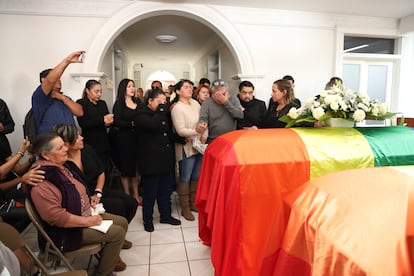
The argument in the bedroom
Figueroa explains what — according to the investigation — probably happened after Baena and Nieves arrived at the home. “We see that an argument begins in the bedroom. That’s where Dorian’s first attacks on Ociel begin. At that moment, Ociel — as if trying to escape — goes to the ground floor, but he’s injured, he’s dripping blood. Dorian follows him and, at the bottom of the stairs — where the lifeless body was found — is where the fatal injury takes place. A lot of blood is spilled. Dorian [realizes] what has just happened and [leaves the area]. He was barefoot, the footprints correspond to the shape of the arch and sole, which we found in different parts of the house and on the ground floor. [Investigators] also found those footprints going up and down the stairs.”
What the State Prosecutor’s Office believes is that Nieves used two razors to commit the murder. Finally, he placed one of them in Baena’s left hand when he was lying lifeless on the ground. These two utensils — as Figueroa has described — are knives that are about two or three centimeters long, with edges on all four sides. “These [kinds of] razor blades were used about 40 or 50 years ago,” he specifies. He also reports that, while Nieves had superficial wounds on his left hand, Ociel Baena had about 19 wounds all over his body, mainly on his shoulder. “The only injury [Dorian] had was a slight injury to his right hand and injuries to his fingers. They were both left-handed, hence the explanation for the type of injury they suffered,” he concludes.
More than 24 hours after the murder, the clearest version for the Aguascalientes Prosecutor’s Office is that Dorian Nieves Herrera caused all the injuries to his partner, then went up to the bedroom and used the second knife to end his own life. Regarding the investigations into the death threats and constant harassment that the magistrate received, Figueroa said: “Everything on social media [is also being considered]. It’s the [line of investigation] that could lead us to a hate crime. But the key thing is that a message doesn’t kill: what kills is the specific action that occurred inside the home. It’s very clear to us that the activism and profile that Ociel had was what generated many of the threats from netizens, which are being generated every day, every second, in all parts of the world, because Ociel was a [public figure], it must be said. [Because of] his very strong activism, we’re not closing [the door to this] in any way.”
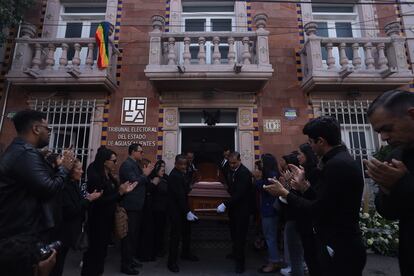
Prosecutor’s Office faces questions
This past Tuesday afternoon — after a mass was held in the Cathedral of Aguascalientes, with the bodies of both victims — family and friends gathered at the facilities of the Electoral Tribunal to pay a heartfelt tribute in memory of the magistrate. There, in that small space — where two coffins with the rainbow flag remained at the center of the event — Baena’s family rejected the conclusions that the authorities have reached.
Juan Baena, father of Ociel Baena, has called for the case to not be allowed to stagnate: “[The version provided by the Prosecutor’s Office] shows a lack of respect to our intelligence. What they’re [saying] isn’t true — it would be a disgrace to allow the justice system to issue a judgment that isn’t correct and that I believe the majority of people don’t believe. I hope that, one day, my son — wherever he is — will see that the results of his fight were not in vain.”
Wilfrido Salazar — the legal advisor for the civil organizations that make up the Community for Diversity, Rights and Citizenship (CODDEC) in Aguascalientes — has reported that what the Prosecutor’s Office’s actions have done is increase the feeling of fear among diverse community groups within the state. “With the very hasty response — which worries us greatly — from the Prosecutor’s Office, social and political uncertainty is generated. [There’s the widespread feeling] that the state isn’t protecting you; that instead of investigating, it tries to come up with a discourse that’s also very stigmatizing, like the one from the 1970s and 1980s about ‘crimes of passion.’ And what’s more, it says it like this: ‘We haven’t completed the collection of evidence, but there’s no evidence and there are no traces of third parties.’ So, if you haven’t completed the collection of evidence, at what point do you assume that there are no traces of third parties?” he asks.
Various organizations and members of civil society have joined in with what was expressed by the magistrate’s family and by the legal representative of CODDEC. The National Human Rights Commission (CNDH) has initiated a formal complaint, calling for the case to be reviewed. “It’s necessary to assume that, although climates [of fear] don’t kill, they do generate conditions and environments favorable to the behaviors of specific people,” the group published in a statement.
Sign up for our weekly newsletter to get more English-language news coverage from EL PAÍS USA Edition
Tu suscripción se está usando en otro dispositivo
¿Quieres añadir otro usuario a tu suscripción?
Si continúas leyendo en este dispositivo, no se podrá leer en el otro.
FlechaTu suscripción se está usando en otro dispositivo y solo puedes acceder a EL PAÍS desde un dispositivo a la vez.
Si quieres compartir tu cuenta, cambia tu suscripción a la modalidad Premium, así podrás añadir otro usuario. Cada uno accederá con su propia cuenta de email, lo que os permitirá personalizar vuestra experiencia en EL PAÍS.
¿Tienes una suscripción de empresa? Accede aquí para contratar más cuentas.
En el caso de no saber quién está usando tu cuenta, te recomendamos cambiar tu contraseña aquí.
Si decides continuar compartiendo tu cuenta, este mensaje se mostrará en tu dispositivo y en el de la otra persona que está usando tu cuenta de forma indefinida, afectando a tu experiencia de lectura. Puedes consultar aquí los términos y condiciones de la suscripción digital.








































